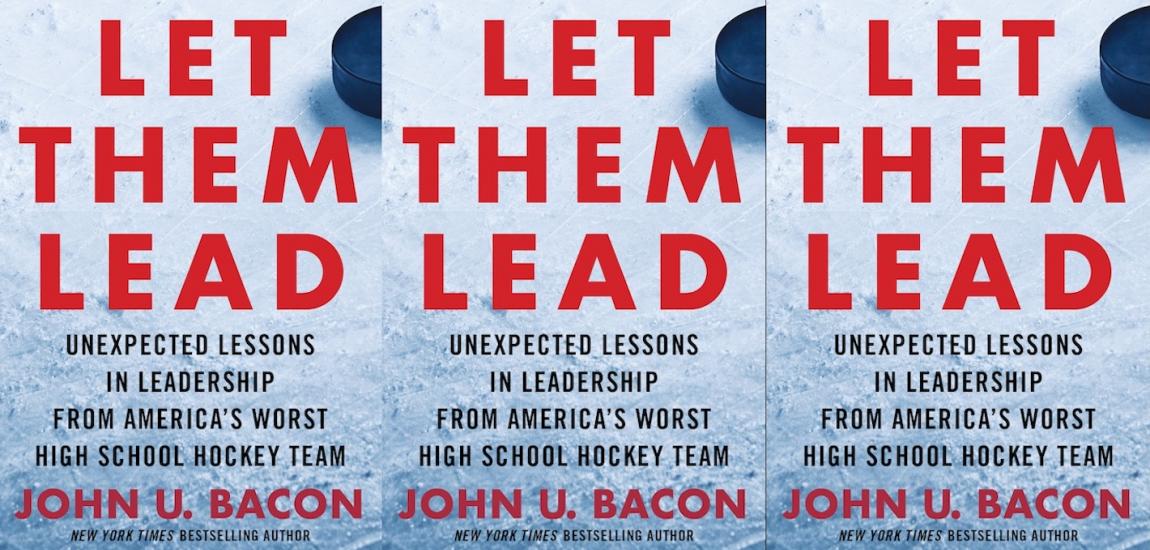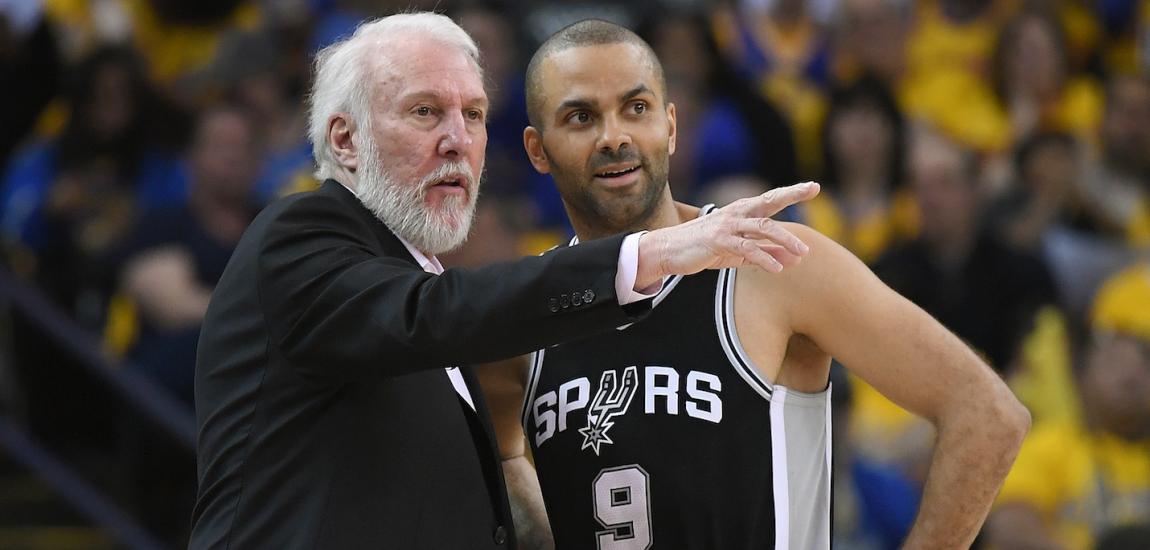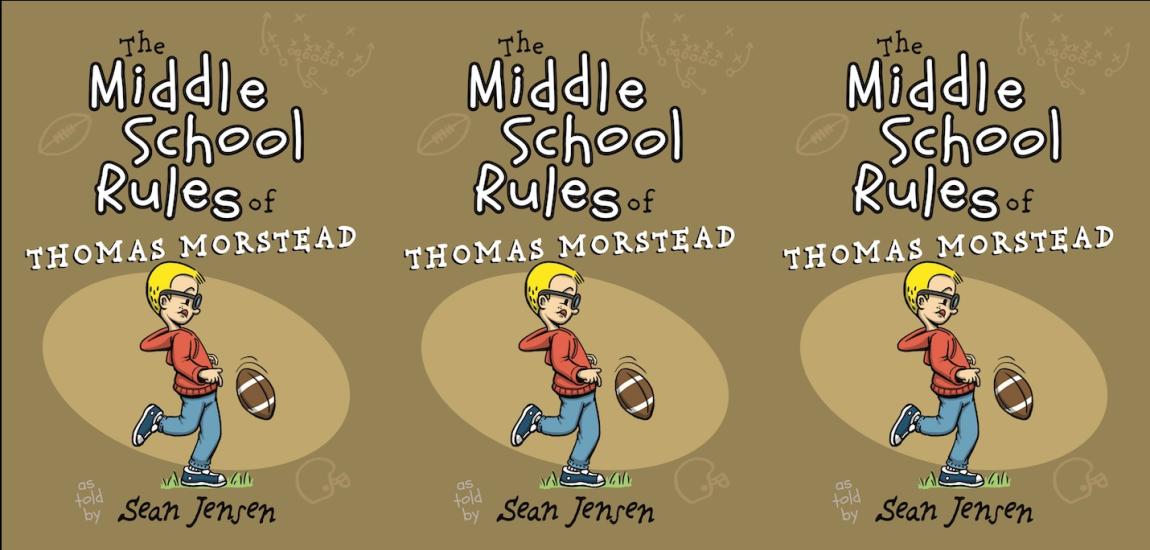Super Bowl XXV between the Bills and Giants is considered to be one of the greatest games in NFL history. A new book -- "Super Bowl Monday: From the Persian Gulf to the Shores of West Florida: The New York Giants, the Buffalo Bills and Super Bowl XXV" -- revisits many intriguing subplots from both teams on their way to the Super Bowl. A big story line was how the two conference championships played out against the backdrop of the first Persian Gulf War, which was just getting underway:
Throughout the entire week, NFL Commissioner Paul Tagliabue listened to debates on the issue and sought input from each of the league's owners and NBA Commissioner David Stern. The White House also weighed in.
"Our attitude is that the business of the nation has to continue and should continue, and we are conducting this war with a high degree of public support," Press Secretary Marlin Fitzwater stated. "We don't see any need why people should disrupt their lives any more than necessary. The President's attitude is that the games should go on."
Even if it didn't quite fit his job profile, George Bush's secretary of Housing and Urban Development took to serving as an informal liaison between Tagliabue and the White House. As a six-term member of the U.S. House of Representatives, Jack Kemp had been a faithful public servant to New York’s thirty-first, thirty-eighth and thirty-ninth districts. He was also the only man to ever quarterback the Buffalo Bills to a championship.
Kemp played seven of his twelve professional seasons in a Bills uniform, and won both the regular-season and championship game MVP in 1965. That year, Buffalo won a second consecutive AFL title, defeating Sid Gillman’s San Diego Chargers. (Each of Buffalo's championship-game victories came against San Diego and Gillman, who cut Kemp in the middle of the 1962 season because he believed that the Chargers "could not win consistently with Jack.")
The seven-time all-star retired from football in 1969, the AFL's final season, and transitioned into politics. After twenty-eight years as a congressman, he joined President Bush’s cabinet in 1989. With Kemp's assurances from the "highest levels of the Defense Department," Tagliabue elected to proceed with the championship games.
"We can't be paralyzed as a nation for the situation," he announced, "and can’t act out of fear. We have to maintain appropriate respect for the situation, and keep appropriate proportion. So we've decided to play the games, but we're going to follow events right up until the kickoffs. There could be a change at any moment."
Just after 1 p.m. EST, the Bills sprinted out of the tunnel and onto the Rich Stadium turf. The crowd of 80,324 erupted as the starting offense lineup was announced over the public address system. And for all those who felt conflicted about cheering, arguing, and pleading over a trivial sporting event in times of war, the game was not a contest for long.
Buffalo was on its way to a 41-3 halftime lead against the Raiders, and Bills fans at Rich Stadium could now relish every moment of the decades-overdue victory. But for millions of television viewers across the nation, Buffalo's championship coronation was abruptly halted.
"We understand there are some important developments in the Gulf crisis," Dick Enberg told the audience. "We go to NBC News and Garrick Utley." "Yes Dick," said Utley, "We’re going right to Saudi Arabia, there appears to have been a missile attack against the big base there. We're going to [Saudi Arabia] to get the situation." The screen cut to a fairly young, handsome man standing on a rooftop at night, shouting out orders to a camera crew.

"Get us up in audio," he said, waving his arm up and down. "Please, get us up," he repeated, pointing to someone offscreen. The reporter readjusted a tiny microphone attached to his vest. "Hello, New York, this is Saudi Arabia. This is not a drill,” he said as he shot a look off into the pitch-black horizon. "Hello, New York, this is Saudi Arabia. This is not a drill,” he repeated.
Now he waved a gas mask in front of the camera. The man was Arthur Kent, a thirty-seven-year-old Canadian-born television journalist. During the ensuing weeks, Kent's name, and the powerful image of him standing on that hotel rooftop would become inextricably linked to the Persian Gulf War.
"We're firing Patriots. We've got flares and we've got sirens. "Let's go, focus," he shouted. A harried Kent turned back into the night, then frenziedly recoiled and ducked. "There goes a Patriot. Let's go!" "Arthur Kent, you are now live from Saudi Arabia, tell us what has happened” said Utley. The scene viewers had just watched was taped footage from a few minutes earlier.
There was no update from Kent.
"We apparently do not have audio, from Arthur Kent," said Utley, only adding to the hectic drama. “"But just to recap quickly, a few minutes ago, a number of Patriot missiles -- those are the U.S. antimissile missiles -- were fired from the big base there in Saudi Arabia -- apparently, against incoming missiles from Iraq. We will bring you further details as soon as we get them from Arthur Kent on the scene there. Now back to the game and Dick Enberg."
"Boy, Garrick, that's sobering news from the Middle East," said Enberg, resuming the live action from Orchard Park, New York. "Boy, the perspective changes so dramatically when we get the real important news of this day."
Later that day in San Francisco, the Giants beat the 49ers 15-13 to win the NFC title on Matt Bahr's 42-yard field goal as time expired.
"That's probably the greatest game I ever coached in. There were a lot of great players playing in that game. Some on our side and certainly quite a number on San Francisco," Bill Parcells said in 2010, four years after coaching the last of 505 NFL and collegiate games. "I think everyone who played in that game realized that that was a very special game. It certainly was for me.
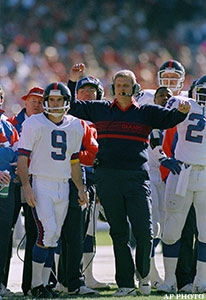
"Jerry Markbreit was the referee of the game. He told me years later that he was the head referee for [437] games. He told me that was the greatest game he ever officiated."
Anyone not in Candlestick Park that afternoon nearly missed the sights and sounds of the Giants' miraculous win.
All afternoon, NFL Commissioner Paul Tagliabue remained on-call, ready to replace the national CBS television broadcast in favor of live coverage from the Persian Gulf.
"The decision was made as close to kickoff as he could make it," NFL Vice President of Communications Joe Browne said. "It was made after he saw there were no major events."
Still, on at least one occasion, television producers somehow relayed a message informing the referee to extend an on-the-field timeout. They did not want the viewers at home to miss a single play while CBS anchor Dan Rather's report on a missile attack in Saudi Arabia ran long.
Even at Candlestick, the war was not far from people's minds. San Francisco police on special duty and mounted officers guarded the field up until an hour before game time. Inside the Giants' locker room, the war couldn't be ignored. Ottis Anderson, Pepper Johnson, Gary Reasons and Matt Cavanaugh each had a cousin in the military, as was Bob Mrosko's brother. And linebacker Johnie Cooks stayed up most of Wednesday night and Thursday morning with his sobbing wife as they watched the news: his uncle, cousin, and brother-in-law each served in the Gulf.
"Life has to go on," Cooks said. "It would be better to be playing and give people something else to think about for three hours. We’re sad about what’s going on, but it’s something we’ve got to deal with."
On game day, Giants players wore yellow wristbands to honor the American sailors and soldiers. Giants owner Wellington Mara -- a naval lieutenant commander during World War II -- approved the wardrobe addition.
After his kick sailed through the goalposts, Bahr shouted, "This is for the troops," and waved the wristband in the air.
"The NFL didn't like it," Bahr said years later.
League officials probably also didn't like Mark Ingram's political statement. Ingram, the Giants' leading receiver that day, played the entire game with the word "PEACE" written in black marker across athletic tape covering his left wrist.
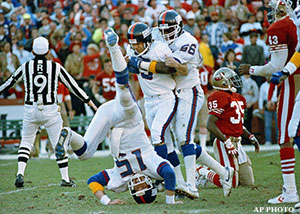
To the players, fans, and the television executives, this was largely uncharted territory.
"This game, of course, was played under heavy security," CBS' Greg Gumbel asked Lawrence Taylor during a postgame interview. "A great deal of discussion about whether or not football games should even be played. Did that enter into your thinking at all as you came out onto the field or as you played today?"
"When you see all the security," Taylor responded, "it makes you realize that the war is real, it's not a joke. And even though it's fought all the way over there in Saudi Arabia and Iraq, it's touching home right now. It's a little scary but as far as the guys over there, I'm proud of them, bring us back a victory. And I just wish the people over here would stop all the protesting and support those guys. Those guys are fighting for us."
A day before the city hosted its fourth NFC Championship Game in ten years, thirty-five thousand people marched from San Francisco's Mission Dolores Park to an antiwar rally at the Civic Center Plaza. Seventeen hundred demonstrators had already been arrested that week in San Francisco, and upwards of forty thousand protesters were expected to protest the next day outside Candlestick Park, prior to and during the NFC Championship Game (although actual turnout ended up being considerably lower). That weekend, tens of thousands more demonstrated in Los Angeles, Boston and Washington, D.C. And rallies -- some pro-war, some antiwar, some both -- cropped up across the rest of the nation, in places like Lawrence, Kansas, Charleston, West Virginia, and Fayetteville, Arkansas.
But for most of the enormous television audience (Nielsen ratings estimated a 26.9 share of the market, 24.4 million homes), the Giants' engrossing victory served as a much-needed pause from a week's worth of frightful headlines and televised Pentagon briefings.
"Nobody forgot about the guys over there," said Barney Fitzpatrick, a bartender at an Upper West Side Manhattan sports bar, "but the country needs morale over here too. The American way is here, and football is part of the American way. Why let Saddam ruin our game?"
Americans didn't let Hussein ruin the game that Sunday; neither did the American servicemen and servicewomen who watched or listened to the NFC Championship Game on the Armed Forces Network.
"How many were able to see it, we don't know. We have no way of telling," said Air Force Colonel Richard L. Fuller. "We haven’t had any mail yet and we don’t get any phone calls from them. They're pretty busy, but they tell us to keep up the news and thanks for the sports."
-- Adam Lazarus is the author of "Super Bowl Monday: From the Persian Gulf to the Shores of West Florida: The New York Giants, the Buffalo Bills and Super Bowl XXV." Lazarus is also co-author of "Chasing Greatness: Johnny Miller, Arnold Palmer, and the Miracle at Oakmont." For more information, visit his website and follow him on Twitter @lazarusa57.
(Reprinted with permission from Taylor Trade Publishing/Rowman & Littlefield Publishing Group.)


